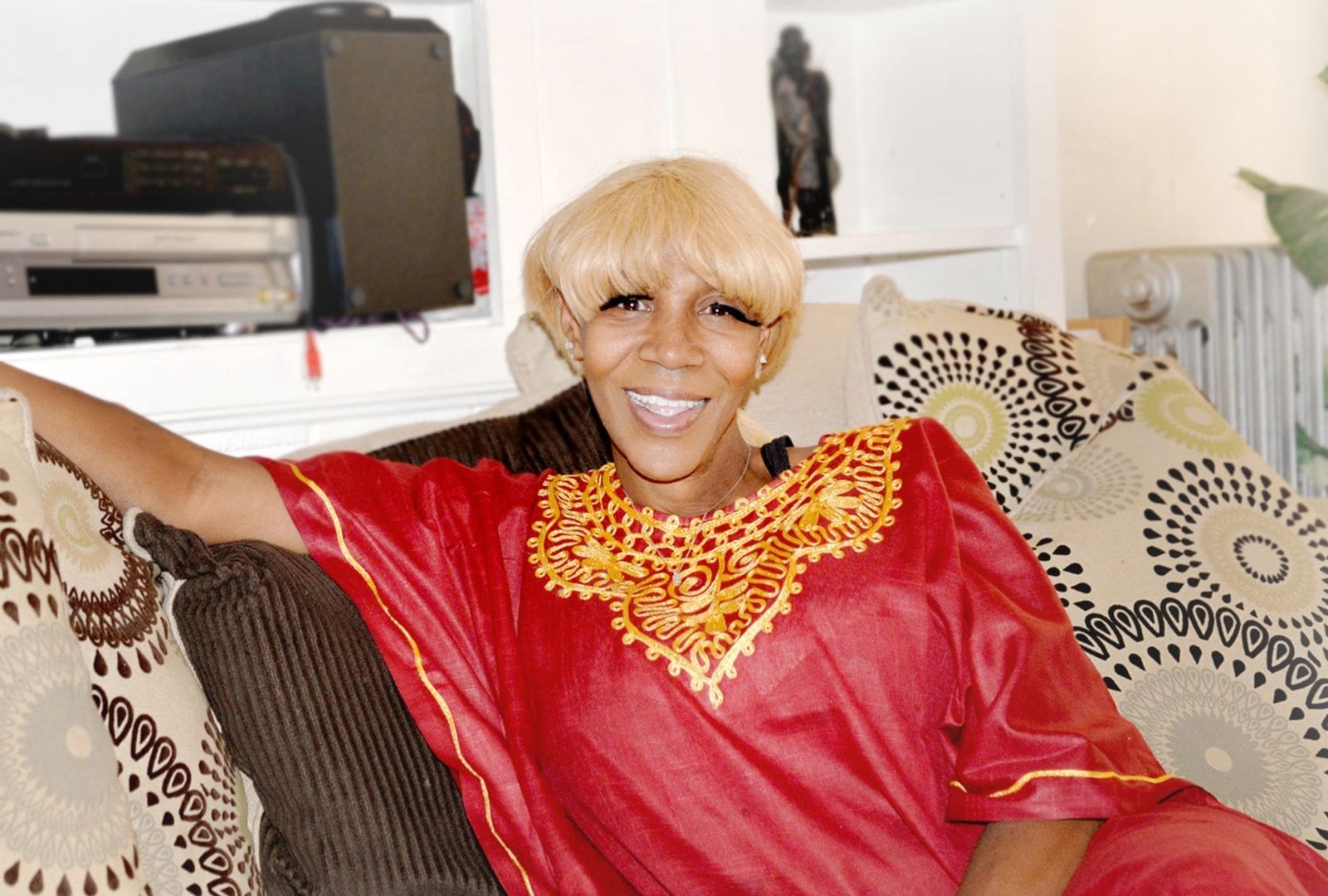by Mirhanda Alewine, communications coordinator
Caprice Carthans, a trans woman of color and one of the co-chairs of the AIDS Foundation of Chicago’s Integrated Community Advisory Board (CAB), has made healthcare advocacy for Chicago’s community of trans women her mission.

When I finally set foot on Carthans’ block in Chicago’s Marquette Park neighborhood, I feel as if I have been wandering toward her apartment building for far longer than the fifteen minutes that have actually passed. She greets me with a sweeping smile, waving her arm back and forth broadly from the doorframe of her brick apartment building; her voice, simultaneously gravelly and sincere, shouts my name loudly down the street, beckoning me down the sidewalk. The sunshine highlights both her blond ponytail and the decorative golden thread along the neckline of her dress, and the bright morning light covers her in what seems to be her own personal spotlight.
The bottom hem of her garnet muumuu grazes her ankles as the door allows the wind to sneak in behind us. Gracefully leading me up the stairs to her unit, my host asks hurriedly if I’ve had my morning coffee; the speed of her language indicates that she has perhaps already had a cup or two. She ushers me quickly into her home, shooing me into a comfortable beige chair adorned with a leopard-print throw pillow. She treats me, a near-stranger, with an immediate familiarity typically reserved for close friends.
“My mother was my first advocate.”
Carthans’ penchant for hospitality is a sort of family heirloom, passed directly to her from her mother, and it remains her secret ingredient for successful grassroots advocacy. Her mother, the person she readily admits to admiring most, was Carthans’ first and greatest supporter.
“When I finally came out to [my mom, at age 11], she said, ‘Well it’s about time you told me!'” Carthans contends that the moment was simultaneously an incredible turning point and a non-event. “Parents always know their children,” Carthans posits, and her mother’s thoughtful actions and reactions made her transition, at least with her large immediate family, seamless.
“Everybody came to the dining table and [my mother] said, ‘Pat has an announcement! She is no longer to be called Pat. Her name is now Caprice. It is no longer he or him, it’s she or her.’ And [my brothers and sisters] were able to practice that at home. So advocacy started for me a long time ago.”
Carthans sits on her soft couch, crossing her legs easily and adjusting her blond bangs with perfectly manicured red nails. She is so comfortable in her own skin. She recognizes, however, that the message of acceptance she received is not the one that so many young trans women experience. “My mom did a good job, [and] I’m fortunate to have that. Often trans folks don’t get that [support].”
“I’m a mover and a shaker.”
A Chicago native, Carthans grew restless while attending Chicago State University and moved to New York City. Throughout her thirty years in the bustling city, she learned to navigate the often difficult and ever-changing healthcare system. “New York [City] has a [broad] resource line,” Carthans admits, and, particularly after she was diagnosed with HIV in 1998, she developed the persistence necessary to traverse the frequently muddled paper-trail leading to these incredible resources. “I’m resourceful. I made it my business to make [receiving services] convenient for me. I’m aggressive in terms of support. I don’t take no for an answer.”
Despite the city’s abundant resources, however, Carthans eventually reached a point at which she was financially unable to continue living in one of the most expensive cities in the world. “It was time to come home,” she acknowledges. Packing up the experiences and knowledge granted to her from her thirty-year relationship with NYC, Carthans moved back to Chicago, the place she calls home.
“My job as an advocate, as a navigator, as a person of color, is to connect the dots.”
When she returned from New York City, Carthans immediately sought out medical case management from AFC, and she was connected with Christian Community Health Center (CCHC). “I made sure to take care of me first, because it’s impossible to take care of other people if you’re not taking care of yourself,” Carthans comments.
CCHC nurtured and developed her passion for giving back to the community, and as soon as she was plugged into appropriate care, Carthans decided it was time to “to roll up [her] sleeves and dig in.” She became a navigator for the Affordable Care Act (ACA) through Heartland Alliance, working to enroll trans women and sex workers in health care. Serving as an essential liaison between providers and new clients, she provided the requisite time and space for trans women of color to talk about health care through small, intimate gatherings.
Carthans felt that the best and most secure place to host these meetings was in her own home, where she could foster a welcoming and stigma-free environment for conversation. “There was no time limit for them to stay here. When the providers were gone, the girls would still be sitting here, talking about things they want to do, reminiscing, relationship building.”
She recalls what it was like for her when she was challenged by providers and her HIV-positive status; she remembers feeling an aversion to receiving medical care from providers well-known for serving the trans or HIV-positive community due to the accompanying side-dish of stigma. “Someone took a risk with me and told me, ‘Look, this is where I go [for health care services]. I know that you don’t want to go where everybody else goes.'”
Many of the young women with whom Carthans works feel similarly, and her unique perspective and experiences, as well as her abundant knowledge of Chicago resources, allow her to provide these women with the discreet health care options they crave.
“Go where they go.”
Carthans is aware, though, that reaching communities involves making herself readily accessible to them. The key to connecting young trans women of color to resources, Carthans argues, is to meet them where they are, and this is the spirit that she brings to AFC’s Integrated CAB. The board consists of current and former AFC clients; according to Carthans, “[their] job as CAB members is to go deeper into communities [to] bring [neighborhood opinions] back to the complete body [of the organization].”
Cathans’ experiences taught her to connect with trans women about health care options where they are and when they’re there. She articulates, “[I] may have to go to the club to make myself available and accessible to them, [and that means] my shift doesn’t start until 5 [or after].”
Ultimately, though, she believes “if you’re willing to take the risk and go into [places that may be unfriendly], you can start the dialogue and open the conversation.” Her experience engaging with her community on an incredibly genuine level allows her to bring a unique perspective to the Integrated CAB, truly creating an opportunity for AFC to continue improving the services it offers and the ways in which it interacts with the diverse population of Chicago.
“I have a vast group of people that I know genuinely love me, that authentically love me.”
As our conversation comes to a close, Carthans slowly reclines further into her seat, and she unveils her vision for the world in her characteristically exaggerated fashion. “I know where my passion lies, what my goal is, and that’s to pass the mantle of all [my] hard work to that baby girl coming up who has the passion to give back to the community.”
Her clear understanding that the fight for accessible health care is long from over pushes Carthans to instill the same passion for advocacy in the young women she connects to care. Her attempt to “always [place herself] in a position to keep people engaged and connect people to the best parts of care possible” fuels her hope that her advocacy will ultimately empower the next generation of trans women to take charge of their health with a similar gusto.



